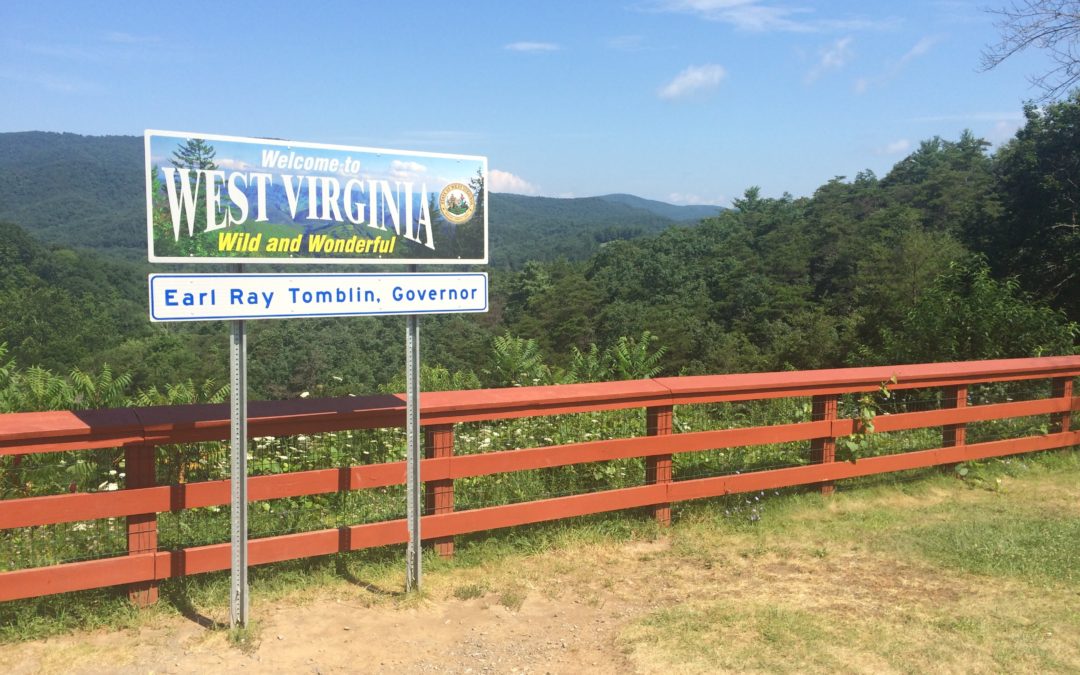
by Heather Vickery | Apr 11, 2017 | Congregational Trip, Economic Justice, Environmental Justice, West Virginia, Youth
In mid-July of 2017, a group of teenagers and adults from the UU Church of Delaware County will visit West Virginia on a UUCSJ Youth Service Journey. In part of the preparation for this pilot program, last week I had the immense pleasure of visiting West Virginia, and meeting with a host of congregations, faith leaders, organizations and activists.
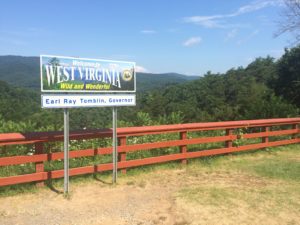 I have to admit, upon planning for this trip, I found myself feeling a range of emotions: intrigued, nervous, romanticizing. Like few other places in the country, West Virginia has come to stand for something very deeply entrenched in our national psyche. It has been heralded as the “home of coal,” and post-election we heard endless analyses of the state of the “white working class” and how on earth they could turn out in such large numbers for someone like Donald Trump. On the other hand, folks in West Virginia often refer to themselves as a “third world country” and as a “national sacrifice zone.”
I have to admit, upon planning for this trip, I found myself feeling a range of emotions: intrigued, nervous, romanticizing. Like few other places in the country, West Virginia has come to stand for something very deeply entrenched in our national psyche. It has been heralded as the “home of coal,” and post-election we heard endless analyses of the state of the “white working class” and how on earth they could turn out in such large numbers for someone like Donald Trump. On the other hand, folks in West Virginia often refer to themselves as a “third world country” and as a “national sacrifice zone.”
It’s clear that there is something at stake in engaging with West Virginia.
One of the first things I noticed upon getting there was the strange fact that West Virginians are on the one hand deeply skeptical of “outsiders” who have come to “do good,” and on the other hand so friendly and hospitable.
They have reason to be skeptical: in the past 100 years, West Virginians have been viciously exploited and plundered by coal companies, northern banks and corrupt politicians. They have watched their breathtaking mountains be destroyed and their water contaminated, their wealth and natural wonders siphoned away to feed the insatiable hunger for national and global progress. And as the coal boom has ended, they have been abandoned. Resources and jobs have fled, and Democrats and Republicans alike have come along with a string of empty promises. The dignity that comes with a job, a community and knowing you are making meaningful contributions to society has withered way, and in that vacuum these same coal companies and political ideologues have imported an insidious narrative of white supremacy and vapid nationalism.
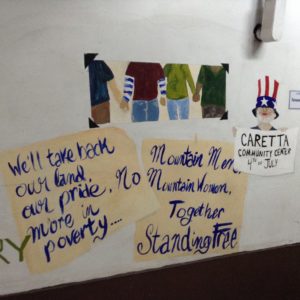 But there is another side I witnessed: West Virginia wasn’t always “white”, and wasn’t always poor, it has a long history of multi-racial activism led by the most affected (especially in coal mining unions), a long history of people fighting for dignity, diversity and sustainable development. And now, in the face of vicious inequality and environmental disaster, ordinary people are coming together to fight for their mountains, their water, their state and for their future.
But there is another side I witnessed: West Virginia wasn’t always “white”, and wasn’t always poor, it has a long history of multi-racial activism led by the most affected (especially in coal mining unions), a long history of people fighting for dignity, diversity and sustainable development. And now, in the face of vicious inequality and environmental disaster, ordinary people are coming together to fight for their mountains, their water, their state and for their future.
I was so deeply moved by all the people I met and learned about, from the justice work, wisdom and commitment of the UU Congregation of Charleston, to the small but mighty New River UU Fellowship trying to put their faith into action, to UUSC partner Legal Aid of West Virginia offering legal support to the down and out, to grassroots organizations like RiseUp West Virginia, Refresh Appalachia, Our Water, WV Environmental Council, the WV Hub and countless others trying to organize for peace and justice. I was so grateful to be part of an Appalachian-wide interfaith gathering as they wrestled with huge questions while trying to lay the foundations for a multi-faith organization to help build a new Appalachia from among the ruins. Lastly, I was so inspired by two rural organizations UUCSJ will be partnering with who are both doing heroic work empowering rural West Virginians: Big Creek People in Action and the Southern Appalachia Labor School.
The UUCSJ Youth Service Journey will offer youth the experience I had: to learn this tragic and complex history, to meet these incredible people, to hear about the contemporary struggles of “third world America,” and to work alongside these folks and witness the tremendous efforts they are making to build their own future and maintain their dignity. It is our hope that this journey will provide a learning experience that goes way beyond the local issues faced by West Virginia and Appalachia. As Rev. Mel Hoover said to me, “So goes West Virginia, so goes America.”
By joining in the effort to build a just, sustainable, inclusive Appalachia, we can help build a just, sustainable, inclusive America (and by extension… world!).
Chris Casuccio, Senior Associate for Immersion Learning
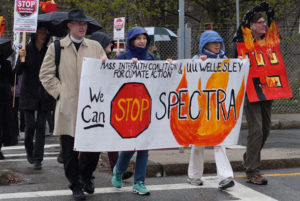
by Heather Vickery | May 6, 2016 | Environmental Justice, Youth
Last month, hundreds of UU activists from across Massachusetts commemorated Earth Day by opening a new season of resistance to the Boston-area West Roxbury Lateral Pipeline, part of a sustained and growing climate justice campaign to disrupt the dangerou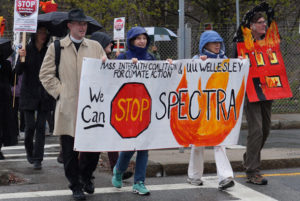 s expansion of the fracked gas infrastructure and fossil fuel economy that threatens us all. Over the last year and a half, members of UU congregations and communities across the state have organized creatively as committed people of faith building collective power to halt Spectra’s pipeline construction, succeeding on several occasions in shutting down the work site, with sustained vigils, rallies, and acts of nonviolent civil disobedience.
s expansion of the fracked gas infrastructure and fossil fuel economy that threatens us all. Over the last year and a half, members of UU congregations and communities across the state have organized creatively as committed people of faith building collective power to halt Spectra’s pipeline construction, succeeding on several occasions in shutting down the work site, with sustained vigils, rallies, and acts of nonviolent civil disobedience.
The campaign was renewed this spring with a vibrant action on April 23rd, which turned out more than 300 protestors on a rainy Saturday morning, just days after the good news that another controversial pipeline project had been canceled, with Kinder Morgan calling of further development of the Northeast Energy Direct (NED) pipeline. The crowd included high school and college students, ministers, community leaders, elected officials and residents of the neighborhood in which the pipeline would be based, posing a significant threat to community health and safety. It was followed by an act of civil disobedience, in which three activists were arrested at the construction site on April 29th, and a Celebration & Lobby Day at the Massachusetts State House on May 3rd to recognize the strides made and keep up the pressure.
These developments build upon months of organizing and training based at several UU congregations across the state, a Call to Action signed by twenty-seven UU ministers earlier this winter, as well as ongoing leadership by UU Mass Action’s Climate Justice Organizer, Evan Seitz, a friend and former staff member of the UU College of Social Justice. The “UU Rising” movement has effectively highlighted that this struggle against the Spectra pipeline is also interconnected with many other efforts for climate justice, as this pipeline is just one more outpost of destruction in a system that harms our planet and all its inhabitants, compelling our moral resistance as people of faith and conscience.
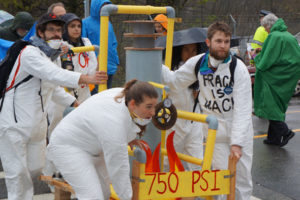 Our upcoming Activate Boston: Climate Justice training will give high school aged youth a timely and immersive opportunity to learn more about this campaign, and others like it, this summer. If you know a young person concerned about climate change and eager to take action for social justice, please encourage them to apply today, with the deadline quickly approaching and generous financial aid available to young people in need who’d like to attend.
Our upcoming Activate Boston: Climate Justice training will give high school aged youth a timely and immersive opportunity to learn more about this campaign, and others like it, this summer. If you know a young person concerned about climate change and eager to take action for social justice, please encourage them to apply today, with the deadline quickly approaching and generous financial aid available to young people in need who’d like to attend.

by Heather Vickery | Apr 8, 2016 | Program Leader, Youth
Read Part 1 of Sam’s Blog, “Why I Love My Work”
What exactly is so special about Activate Youth Justice Trainings that so many of its alums claim to have gone through such an intense and life-changing experience? The simplest explanation for what happens during Activate! is to break it down to these 5 main concepts: Education, Engagement, Growth, Community & Transformation.
Education and Engagement: We use interactive, participatory and fun activities to start learning more about the issues as a group. Meanwhile, we engage groups in activism and hands-on justice work that is happening in the area while we are there. As such, programming evolves and shifts with each passing year as different justice issues emerge and grow. Our programs maintain a certain level of flexibility so that we can respond immediately to current events, and each program is uniquely tailored to focus on an issue that is especially relevant in that region of the country. In 2013, for example, our group immediately switched up our schedule and took to the streets to join other Boston activists in protest when George Zimmerman was found not guilty for killing Trayvon Martin. Last summer, in Tucson, our youth joined a movement for immigration justice to #StandWithRosa as she found Sanctuary from deportation in a local church (pictured below, at an event in support of Rosa’s right to remain in the United States).
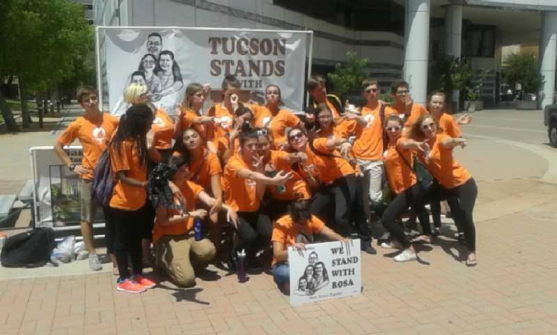
Activate Tucson youth assisting at a big public event to raise awareness about the #StandwithRosa campaign in Tucson. They also helped distribute over 100 lawn signs in the community as part of their work.
Growth: Youth are encouraged to come to terms directly with the identities that they hold and what this means in terms of their privilege and power within different systems. As Jenna Peeples, Activate Tucson ’13 alum, explains: “Even if only for a moment, we are ejected from our concentrated high school lives and put somewhere outside of our comfort zone; this allows us to open our eyes. We catch sight of not only our privilege, but the urgency that is associated with various issues going on around us.” Although participants do not need to be Unitarian Universalist to attend these trainings (and certainly some of our most enthusiastic participants were members of different faiths!) we do incorporate various UU elements and there is an emphasis on spiritual growth. Teens will have time to learn and try out a variety of spiritual practices, as well as plan and run their own youth worship in small groups. This in turn supports the difficult identity and justice-related work. Julia explains: “The UU component made it a place where I felt safe, even when faced with uncomfortable ideas.”
Community: Throughout the week, we do all kinds of fun things to build a tight-knit community amongst ourselves, and then extend that community to build relationships with the local justice-related organizations we’re in partnership with. In some programs teens will cook together, in others they form family groups that spend time reflecting and supporting each other’s processing etc., and we also engage the larger group in a variety of fun community-building and empowering activities. Each cohort has its own Facebook page, and teens often continue posting things many years after the trainings. I cannot even begin to explain how exciting it is in the weeks following these trainings to see the flurry of posts on the group pages about what cool justice thing each is now doing, what exciting protest they are going to that weekend, what thing happened that suddenly reminded them of this or that (and now they have “all the feels”). They form these really special friendships quickly over their shared values and immediate submersion in such difficult, meaningful work together.
Transformation: All of the above ultimately leads to these incredibly exciting transformations for the participants, who soon find themselves overwhelmingly inspired by what they have learned, seen and done. They feel empowered by the experiences and the tools they have picked up along the way; their engagement in social justice work has been *activated* and they go back to their congregations and communities with this freshly-revitalized sense of purpose.
FOR MORE INFO. AND TO APPLY TO CSJ’S SUMMER YOUTH ACTIVATE PROGRAMS, PLEASE CLICK HERE!
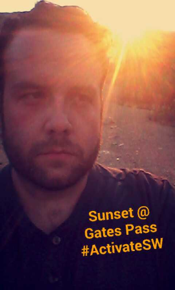 Sam was consistently struck by the juxtaposition of such hideous, dehumanizing and tragic acts of hatred toward people crossing the border; set against the natural beauty and allure of the sunsets in Tucson.
Sam was consistently struck by the juxtaposition of such hideous, dehumanizing and tragic acts of hatred toward people crossing the border; set against the natural beauty and allure of the sunsets in Tucson.
Questions about Activate! and how to support your youth in attending an upcoming Justice Training? Email Sam at swilson@uucsj.org

by Heather Vickery | Mar 29, 2016 | Program Leader, Youth
A Program Leader Reflects on UU Youth as the Present and the Future; The Change We All Wish to See
My name is Sam Wilson, and my primary job is to serve Winchester Unitarian Society (WUS) as their Director of Youth Ministries, which means that I feel incredibly blessed to count myself amongst those who truly love what they do! I also have the incredible fortune of being a Program Leader for the UU College of Social Justice, which means that during my time off from WUS over the summer, I get to meet and connect with even more UU teens by leading UUCSJ Activate! Youth Justice Trainings. I actually found the CSJ booth at its debut UUA General Assembly in Charlotte rather accidentally; I was still in college at the time and wanted to see how I could transfer there!
Cut to 4 years and 4 more GAs later, and I have now proudly led 2 Youth Justice Trainings in Boston and the pilot Activate! Training in Tucson last summer, helped with 1 pre-GA Activate! training for youth, served on panels for 3 CSJ-led workshops on youth and justice work, and even manned that CSJ booth a few times while explaining to several different people that the name is actually a bit of a misnomer, and no, you cannot actually get a college-level degree from us! I also always add that you can, however, get the experiential and transformative education of a lifetime in way less time (and without any student loans afterward, too!)
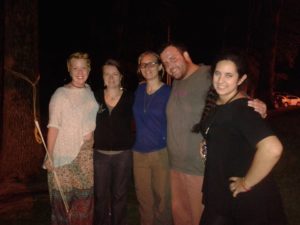
All youth staff for NYJT ’14 (now called Activate). From left to right: Ravenna, Charis, Kye, Sam and Alexandria
As you can probably tell, I am a big fan of working for CSJ, and really enjoy doing as much as I can to support them. There is one thing, however, that really bums me out about this work, sometimes a program doesn’t run. Last summer I was all set to lead my 3rd Youth Justice Training in Boston, but the program was cancelled due to under-enrollment. You might be thinking “who cares; if only a few youth signed up then there were only a few people who didn’t get to do it.” Here’s the thing, though. Every single youth I have ever talked to about their experience during Activate! tells me some version of the following:
“The Boston trip was one of the most formative experiences of my life… I was a completely different person before and after and it left me with a desire to make the world a better place, while giving me the tools to do so… It’s an experience that everyone should try to have to better themselves and the world.”- This quote comes from Julia Nichols, a teen I first met in 2013 at the Boston Training, and then again in 2015 when she came back for Activate! Tucson (where I was thrilled to hear about all of the justice work she had been doing at her school in the interim). Julia intends to do the NOLA Activate! with us this summer, too, and is one of several planning on attending their 3rd training with us then.
What this means, though, is that every slot that is not filled by someone on an Activate! Program means one fewer young person who gets to have a life-changing experience that summer, who has the tools to become a thoughtful and engaged activist before even getting to college, and who goes back to their congregation and community excited to share their newfound passion and skills with other potential advocates, allies and activists.
Activate Alum, Alexandria Boutros, has said, “There are so many UU youth all over the country who would love this. I did this program… and then my life became justice.” I first met Alexandria at the Boston Training in 2013. Now she is a sophomore at DePaul University, where she majors in Peace and Justice Studies with a Minor in Community Service Studies, while interning for The Food Chain Workers’ Alliance. She continues: “I literally would not be at DePaul right now, studying Peace and Justice, if it were not for the Boston training.”
For me, these programs represent the convergence of my two main passions: ministry with youth, and social justice work. I am simply amazed by the thoughtfulness, intelligence, compassion and individuality that each set of UU youth brings every year. Plus, like these youth, I am a big fan of keeping things interesting by contrasting absurd irreverence (let’s make pancakes! With pink food coloring! And cloud sprinkles! While dancing!) with deep, heartfelt moments of reverence, grace, love, and often sadness too. Every single training I have attended there is at least one moment where I am caught off-guard by my own immense pain at learning about some new, insidious manifestation of hatred and injustice that I had not previously considered. Suddenly tears are flowing down my face, and I’m momentarily flustered as our roles are briefly reversed and the teen asks me if I’m okay while offering a hug.
I’ll wrap my thoughts up by letting readers in on a little secret (that I’d bet resonates with most if not all of the other people who get to work with UU youth). I love this work for the exact same reasons that all of these teens do. In our programs, the youth and adults simultaneously act as participants and leaders, teachers and learners, speakers and listeners, poets and readers, and worshippers and preachers. For I, too, always emerge from these trainings a different person from the week before. My eyes are cracked open just that much more to truth; my heart set that much stronger on paving the road to justice with equity and love.
Read Sam’s follow up post “5 Reasons Why You Need to Tell Every Teenager You Know to Apply Now!”
by Deva Jones | Sep 28, 2015 | Immigration, Youth
This post was written by Jack Spector-Bishop and originally posted on Blue Boat.
“What do you do when you come head to head with the very evil you are working against?”
“The ants crawl under it, the birds fly around it, the sky connects over it.” This is what I wrote in my journal while I sat in the shade of the US-Mexico border wall, near Douglas, Arizona. The wall loomed behind me, constructed of massive, two story high rusty metal beams and stretching as far as I could see. Poles with floodlights and cameras were everywhere, along with trenches, barbed wire, and fences. All of it seemed so arbitrary. It was weird a place to be — it was just an inanimate, sterile wall and yet I felt a suffocating atmosphere of pain. Even though we were in an empty desert, it felt like a place of violence.
I traveled to the wall during the UUCSJ’s Activate Southwest Border program, in which around 20 youth (mostly Unitarian Universalsists) from around the country met in Tucson, Arizona for 10 days to learn about immigration issues in the borderlands, and receive training in social justice organizing. I and my fellow travelers had countless moving and informative experiences (including witnessing Operation Streamline, and working with the We Stand with Rosa campaign), but our visit to the border wall still sticks in my mind as the most memorable. As our group began trudging up a hill, we saw a fast approaching cloud of red dust in the distance take shape as a U.S. Border Patrol squad car. We had no reason to be afraid — the public does have access to the pathways along the border, but it still made us a little anxious. This anxiety only increased as the car pulled up alongside us, parked, and the Border Patrol agent began getting out and talking to us. Part of me, deep down, hoped that he would be one of the “good ones”. That this was just a job to him. That he was a decent guy trying to bring dignity to a cruel institution. Unfortunately, I was disappointed. As he chatted with us and asked us what questions we had for him, it became clear that he fit exactly the stereotypes of his profession. I’m not going to repeat what he said — just turn on Fox News or watch the GOP Presidential debates and you’ll hear the same things. It was ugly, hateful racism, spoken in the most casually self-righteous manner you can imagine. What do you do in that situation? What do you do when you come head to head with the very evil you are working against? As I pondered these questions over the following days, scripture came to mind, “We wrestle not against flesh and blood, but against principalities, against powers” (Ephesians 6:12). That border patrol agent was not the enemy — he was just flesh and blood. It became clear to me that the enemies we are fighting are the institutions he stood for. We are fighting Border Patrol, we are fighting Immigration and Customs Enforcement (ICE), and we are fighting the legislation that makes the persecution of undocumented citizens legal.
Jack Spector-Bishop is 17 and attends the Countryside UU Church in Palatine, Illinois. He is currently serving on the Midwest district’s Northern Area Youth Council and this is the second UUCSJ program he has attended. He is passionate about art and social justice, and hopes to someday work for the Unitarian Universalist Service Commitee (UUSC).
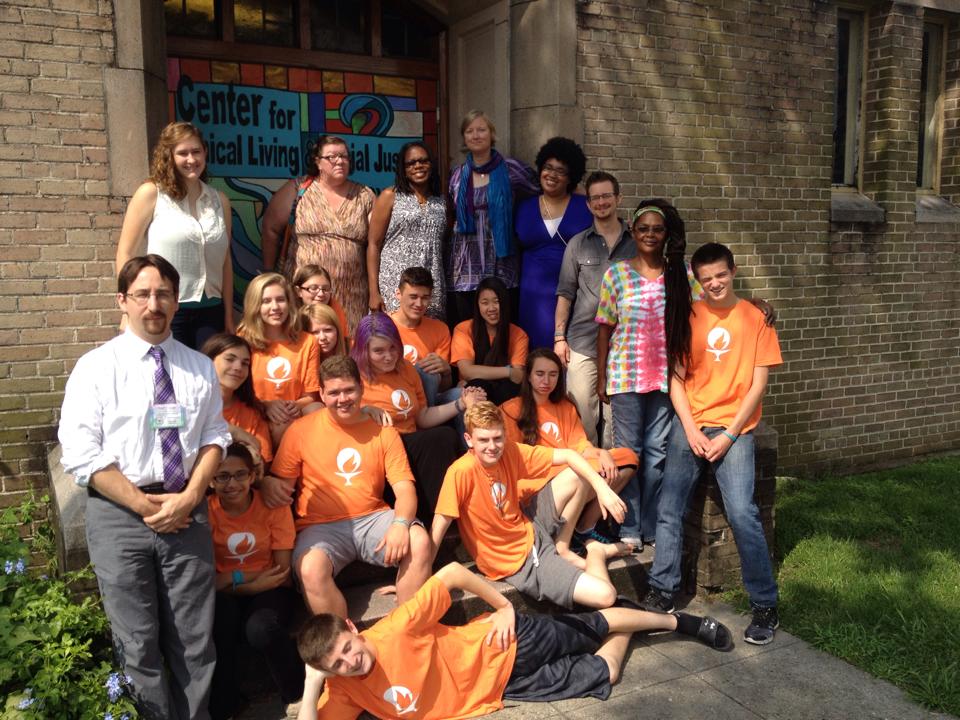
by Deva Jones | Feb 4, 2015 | Youth
This post was written by a parent of one of last year’s participants from our youth justice training in New Orleans.
Last spring, we began the annual ritual of finding something for our son Jack to do over the summer. Then 15, Jack had attended UU church since the 1st grade, and while I looked at a wide range of options, the UU College of Social Justice programming stood out. I loved the idea of strengthening Jack’s ties to the faith and, as an enthusiastic youth group and CON participant, he loved the idea of a week-long UU experience in such an exciting city.
But I wasn’t expecting much. I knew that the UUCSJ was still pretty new, and suspected the program might be glorified babysitting. In this I was entirely mistaken. The New Orleans trip literally changed Jack’s life. He returned home with deep connections to UU youth throughout the country, and an intensified commitment to social justice issues that is beginning to shape his thoughts about college and the future.
Sometimes the best lessons come from unexpected sources. During Jack’s stay, the group attended a church service that was disrupted by the pro-life Operation Save America. The way that UU Minister Deanna Vandiver handled the situation demonstrated, as no workshop or presentation could, how to meet anger and hate with non-violent love and resistance.
Behind every eager youth participant is an anxious parent, and I had my share of worries about how well the program would be run. Again, the New Orleans program exceeded my expectations. Both the Boston staff and the onsite program team were incredibly competent, caring, and responsive to my questions and concerns.
Jack will finish 11th grade in June, and we are once again exploring summer opportunities. Although many factors are coming into play – including those ubiquitous college visits – near the top of the list is the Activate Southwest Border trip. And truly, there can be no greater “testimonial” to the efficacy of the CSJ’s programs than that.
Janet Spector Bishop
Mother of Jack Spector Bishop, participant in the summer 2014 New Orleans youth trip


 I have to admit, upon planning for this trip, I found myself feeling a range of emotions: intrigued, nervous, romanticizing. Like few other places in the country, West Virginia has come to stand for something very deeply entrenched in our national psyche. It has been heralded as the “home of coal,” and post-election we heard endless analyses of the state of the “white working class” and how on earth they could turn out in such large numbers for someone like Donald Trump. On the other hand, folks in West Virginia often refer to themselves as a “third world country” and as a “national sacrifice zone.”
I have to admit, upon planning for this trip, I found myself feeling a range of emotions: intrigued, nervous, romanticizing. Like few other places in the country, West Virginia has come to stand for something very deeply entrenched in our national psyche. It has been heralded as the “home of coal,” and post-election we heard endless analyses of the state of the “white working class” and how on earth they could turn out in such large numbers for someone like Donald Trump. On the other hand, folks in West Virginia often refer to themselves as a “third world country” and as a “national sacrifice zone.” But there is another side I witnessed: West Virginia wasn’t always “white”, and wasn’t always poor, it has a long history of multi-racial activism led by the most affected (especially in coal mining unions), a long history of people fighting for dignity, diversity and sustainable development. And now, in the face of vicious inequality and environmental disaster, ordinary people are coming together to fight for their mountains, their water, their state and for their future.
But there is another side I witnessed: West Virginia wasn’t always “white”, and wasn’t always poor, it has a long history of multi-racial activism led by the most affected (especially in coal mining unions), a long history of people fighting for dignity, diversity and sustainable development. And now, in the face of vicious inequality and environmental disaster, ordinary people are coming together to fight for their mountains, their water, their state and for their future.

 s expansion of the fracked gas infrastructure and fossil fuel economy that threatens us all. Over the last year and a half, members of UU congregations and communities across the state have organized creatively as committed people of faith building collective power to halt Spectra’s pipeline construction, succeeding on several occasions in shutting down the work site, with sustained vigils, rallies, and acts of nonviolent civil disobedience.
s expansion of the fracked gas infrastructure and fossil fuel economy that threatens us all. Over the last year and a half, members of UU congregations and communities across the state have organized creatively as committed people of faith building collective power to halt Spectra’s pipeline construction, succeeding on several occasions in shutting down the work site, with sustained vigils, rallies, and acts of nonviolent civil disobedience.




